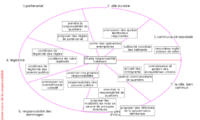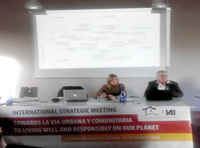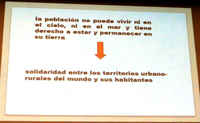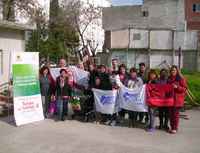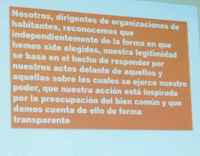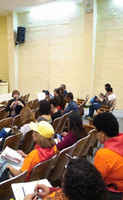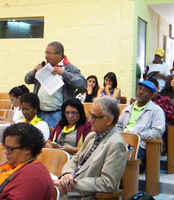Systematization of the process for elaborating the Charter of Inhabitants’ Responsibilities
The process for elaborating the Charter of Inhabitants’ Responsibilities was based on the involvement of organized groups of inhabitants and culminated in approval of the Charter at the Forum for Resistance to Habitat III , in the auditorium of the Faculty of Architecture at Quito Central University on 18 October 2016.
The Alliance for Responsible and Sustainable Societies (founded in 2003) is an evolution on the “Charter of Human Responsibility” programme put forward by the “Alliance for a Responsible, Plural and United World” (1993-2002). The Charter programme (December, 2001) also gave rise to the “Forum of Ethics & Responsibilities” (FER), launched in 2009.
In October 2014, key members of the FER met in La Bergerie to discuss their state of affairs and create a plan of action. The "Alliance for Responsible and Sustainable Societies" was the result of this process.
Given their shared long-term goals, vision and strategy, it was agreed that a “Charter of Inhabitant’s Responsibilities” – coordinated by Cristina Reynals and the Alliance for Responsible and Sustainable Societies – would be drafted in 2016.
1) Commitment to making the development of the Charter part of the preparatory process for the People's Social Forum ResistanceHabitat III as well as approving the Charter in a related gathering in Quito in October, 2016 in which members of AR21 will participate.
The IAI – a network of inhabitants’ organisations active at local and international levels since 2003 – met to agree on a Strategic Lines for the period 2016-2020 as part of the Meeting Towards the Urban and Community Way to live well and responsibly on our planet (La Bergerie, Chaussy, France, 11-15 January 2016).
The IAI defends the right and responsibility of inhabitants to be builders, users and co-administrators, rather than simple user-clients, of towns, cities and territories. To this end, the IAI aims to reinforce its ties of solidarity at local and international levels with an egalitarian plan of mutual assistance in cooperation with other social agents, professionals, universities and institutions.
The World Assembly of Inhabitants is the backdrop to this convergence: open, democratic, themed, global and local proceedings which have gathered together hundreds of organisations and networks from all over the globe since the 2011, 2013 and 2015 editions. It has an alternative focus which led to the founding of the People’s Social Forum Resistance Habitat III – in Quito, October 2016 – as an alternative to the United Nations Conference on Housing and Sustainable Urban Development (Habitat III), which has lost its way because the global neoliberal crisis.
For this reason, we held a plenary dedicated to the creation of a Charter of Inhabitant’s Responsibilities during the gathering – which had a theme of fighting and solidarity. Pierre Calame contributed to this process, which was intended as a contribution to the Alliance for Responsible and Sustainable Societies.
An agreement to meet again in Quito in October 2016 with the aim of approving this Charter, as part of the People’s Social Forum Resistance Habitat III , was reached.
2) Workshop on the Charter of Inhabitant’s Responsibilities with local partners. This includes planning, designing, executing and systemising the “Charter of Inhabitant’s Responsibilities” workshop which will be held during the People’s Social Forum in Resistance to Habitat – alternative to Habitat III – between the 16th and 20nd of October 2016 in Quito.
Background
On the 13th of August 2016 in the “Torito Pulenta” Community Dining Room (calle José León Suárez 3787, Buenos Aires) the following organisations joined together as the “Comité Popular” (Popular Committee) towards Quito 2016, Fe.De.Vi., Sembrar Conciencias, Federación de Cooperativas “Todos Juntos”, Frente Territorial Salvador Herrera, Observatorio de la Ciudad de Buenos Aires, among other social organisations defending housing rights in Buenos Aires.
After Jonatan Baldiviezo’s presentation on the issues faced by the city, the leaders present discussed what they have in common so that this information could be shared with other Popular Committees in the country. It is hoped that a road towards unity and dialog in the struggle fought by the different organisations might be found.
The next step involved analysing the proceedings of the Habitat I and II as well as the role of the Argentine government in the presentation of the national report for Habitat III.
The final item on the agenda was the presentation of the first version of the Charter of Inhabitant’s Responsibilities – put forward by Fe.De.Vi. and the IAI and endorsed by the Alliance for Responsible and Sustainable Societies. The representatives decided to support the Charter and requested that it be disseminated. They also agreed to make their contribution as part of the process towards Habitat III. As part of this agreement, the International Alliance of Inhabitants was asked to translate and publish the Charter in French, English and Portuguese. The aim of this was to attract contributions and adherents from among inhabitants in other parts of the world to lead into a workshop.
Workshop Design and Moments
a) Introduction of participants (grouped by language, a list of participants is attached)
b) Introduction of the Charter by Cristina Reynals (PPT is attached)
c) Open mic for participants to share their contributions (see attached photos)
d) Future agreements
3) Presentation of reports on the results of the workshop
The “Charter of Inhabitant’s Responsibilities” workshop was held in the Central University of Ecuador’s’ Architecture department as part of the Habitat III Resistance Forum on the 18th of October 2016.
More than 50 leaders from various countries discussed the contents of the Charter in Spanish, Portuguese, French and English.
Their considerable participation resulted in changes being made to the Charter, which have been incorporated into http://www.habitants.org and http://www.alliance-respons.net/bdf_fiche-document-224_es.html , with the support of the Alliance for Responsible and Sustainable Societies and the International Alliance of Inhabitants, coordinated by Cristina Reynals (Fe.De.Vi).
An intense debate – between the leaders of organisations defending the Right to Housing from all over the world – took place during the workshop, with the leaders subsequently agreeing to back a modified version of the Charter. (A list of participants is attached)
A preliminary agreement to go beyond cities and talk about urban and rural territories, without forgetting about indigenous peoples, as well as to incorporate social sustainability and environmental-ecology was reached.
The Charter will be circulated online where it may reach a wider audience and potentially attract contributions and adherents.
O(A) seguinte Tradutor(a) Voluntário(a) pelo direito à moradia sem fronteiras da AIH colaborou com a tradução deste texto:

